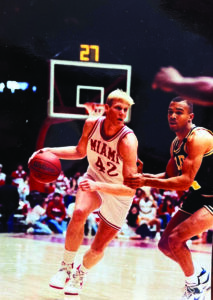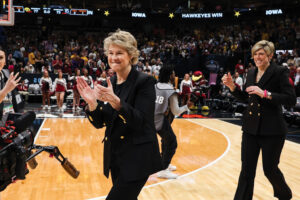Former college basketball player and coach Hanna Howard was recently named CEO of Fort Worth-based Valor, a highly-regarded asset management company known for its expertise in providing mineral management and outsourcing services in the oil and gas industry.
“How the hell did that happen?” she joked, in an October article from Fort Worth magazine.
It’s not as much of a fluke as Ms. Howard may think – there is strong evidence that suggests a correlation between college athletics and C-suite leadership.
In a 2015 study conducted by accounting firm Ernst & Young, coinciding with the 41st anniversary of Title IX, it was found that 52% of C-suite women played sports at a university level, compared with 39% of other female managers. The connection between collegiate athletics and leadership isn’t just relegated to women – it is strong regardless of gender.
Stockdale Paradox

MidWestOne CEO Charles “Chip” Reeves played basketball for Miami University in Ohio from 1986-1990, becoming team captain his senior year. It’s an experience he credits with the person he is today.
“You’re only as good as the rest of your team,” he said, citing “servant leadership” as a driving force behind effective leadership, something he learned from his basketball days. The ability to think quickly on your feet is another important trait for athletes and leaders to have.
“What makes a great college athlete is how quickly and how effectively they synthesize and process information – that moves very nicely to the workplace,” he said.
Citing the Stockdale Paradox – the ability to accept the “brutal” facts of a situation while maintaining faith and optimism in the endgame, with a desire to prevail – was an exercise in a grit mindset that helped him and his banking colleagues get through the financial crisis of 2008.

“It was an incredibly difficult operating environment and period of time,” he said, but credits the key traits of resiliency, servant leadership, collaboration and teamwork with getting through – traits he said he learned as an athlete.
“We (had) the belief and hope that we would, as an industry and as a team, move through that period of time,” he said.
Workforce
A 2014 Peterson Institute for International Economics study found that sports provide useful labor force attributes: the ability to be a team player, to compete, and to win and lose with grace. “Studies show that, on average, former college athletes earn a wage premium over others. Annual wages of former athletes, all other factors held constant, are on average about 7% higher than those of nonathletes,” the study found.
Former Chief Economist at the U.S. Department of Labor, Betsy Stevenson, had very similar findings.
“Athletic participation might be associated with better outcomes later in life either because students who choose athletics have skills that are valued by the market or because athletics fosters the development of such skills…These attributes may include the ability to communicate, the ability to work well with others, competitiveness, assertiveness, and discipline,” she said in her 2010 study.

CIVCO Medical Solutions president Robin Therme, who played as a forward and off-guard in basketball for Iowa Wesleyan University from 1987-1989, said former athletes can certainly be on an employer’s radar.
“That’s a sales recruiting tactic. You want to look for people that played athletics…(it’s nice) if they played at the college level, because they’re competitive. And they also have the discipline of the schedule of a practice, committing to that and committing to the team,” she said.
Dan Matheson, director of the Sport & Recreation Management program at University of Iowa, said while athletics can be a leg up when entering the workforce, it’s not “automatic.”
“It takes somebody who is able to apply themselves as effectively off the athletic field as on it,” he said, but points out that students wxho balance the rigors of coursework with the demands of sports often learn to hone their time management skills, an important trait in the professional world.
“In addition to being able to plan their schedule out, they’re also able to manage multiple high priorities,” he said. “It’s almost another form of experiential learning.”

AssuredPartners Employee Benefits Strategist Barb Randall, a National Iowa Varsity Club Athletics Hall of Fame inductee and a former University of Iowa volleyball player who played collegiately from 1987-1990, 1991-1993 for the USA National team and 1993-1994 professionally in Italy, said athletics doesn’t necessarily make leaders, but it can give them a platform to practice needed skills. Involvement in music and the arts can take an equal amount of discipline and skill, she pointed out.
“I think, anytime you’re in a group of people, especially at a young age, it’s kind of a safe place to practice those skills,” she said. “You can learn a lot about what to do and what not to do…and you can adjust from there.”
In the end, it’s about putting in the work. At the 2023 UI Athletics Hall of Fame Induction, Ms. Randall noticed a theme among the speakers – success centers around hard work. “To a person, every single one of them talked about hard work,” she said. “It’s a sacrifice. It takes time from other parts of your life. So maybe you can’t go out with your friends all the time. Maybe you can’t have some of the fun that other people have – sure. But hopefully in the end, it pays off…and as I’ve gotten older, hard work is the difference in everything.”
Skill vs. support
Some skills are developed on the playing field and in the boardroom, while others are enhanced. Co-founder and president of Coralville-based Bio::Neos, Steve Davis, who competed on the UI gymnastics team from 1999-2002, said he had certain personality traits prior to his involvement with the team that amplified his training.
“Having a background in athletics doesn’t necessarily improve your ability to achieve at the C-suite level,” he said. “But having the personality that helps you succeed, and ultimately achieve that sort of level in business, is also the type of personality that will help you succeed at athletics.
“A lot of it just comes down to being involved in something that you can be passionate about,” he said.
For Mr. Davis, those personality traits were perseverance, persistence and an internal motivation to push himself, even if he wasn’t the top gymnast on his team.
“I definitely was never the best guy on the team,” he said. “But I feel like one of the things that that experience actually taught me is just how important it is to be a supportive player, even in an activity that may seem outwardly very independent.”
Fear of Failure

For many students – and working adults – pushing past the fear of failure is not a suggestion, it’s a requirement to being successful.
For UI women’s basketball Head Coach Lisa Bluder, one of the most important characteristics an athlete can have is a positive mindset and the ability to be resilient.
“They have to be resilient because they’re going to get knocked down a lot, and when an athlete gets knocked down, it’s very public,” she said. “And that can be hard to bounce back from if you worry about public perception or public opinion.”
It’s about making failure a learning opportunity, recognizing that it’s temporary, and learning to move on from it, she added.
From the court to the boardroom
Ms. Bluder has a long list of significant athletic accomplishments under her belt, both as a basketball player and coach for Drake, St. Ambrose, and for 23 years now, the University of Iowa. Basketball has been a force for good throughout her life – and while she played “all sports” in high school, basketball was by far her favorite.
“Athletics was a huge part of my life. It was where I got joy, you know? I got confidence from playing athletics. I was good at it,” she said. “(It) built my self-esteem. I really think that athletics has completely shaped who I am today. Along with my family, those are the two most important elements I think that have shaped who I am today.“
In a 2016 Fortune magazine article, espnW founder Laura Gentile cited the statistics from the Ernst & Young study previously mentioned.
“Girls who play sports have greater social and economic mobility, grow up healthy and confident, and perform better in school. In fact, 74% of executive women agreed that a background in sports can help accelerate a woman’s leadership and career potential,” she said in the article.
With more and more women obtaining advanced degrees and making their way into the boardroom, opportunities to demonstrate their leadership capabilities increase, and Ms. Bluder has long recognized that the court provides real-life opportunities – what Mr. Matheson termed “experiential learning” – that transfer to leadership roles later on.
“They’ve (students) had so many real-life opportunities, some real-life examples that you can’t really learn from reading in a book or sitting in the classroom,” said Ms. Bluder. “Everything from teamwork, team building, how to bounce back from failure, how to win with grace, how to conduct a press conference, how to hold your teammates accountable, how to be a good teammate, having a healthy lifestyle…those are real life lessons our athletes learn.”
“It’s not just about athletics,” she added, “It’s about growing as a female leader.”
For Ms. Bluder, important characteristics for leaders to have is to care about the people they lead, have a vision and a process for achieving that vision, and persuade others to believe in the vision with you.
“I think what’s really important for a leader is not only to be positive, but get other people that can believe just as strongly that you’re going to accomplish it as you (believe),” said Ms. Bluder.

Ms. Therme reiterated that it takes more than one person to make a team or business successful.
“The best teams are when everybody knows what their role is on the team. And that applies to business too,” she said. “I look at my exec team and our extended leadership team. You surround yourself with people that fill in your blanks…we all are bringing something to the table of what it takes to make the whole team successful.”




